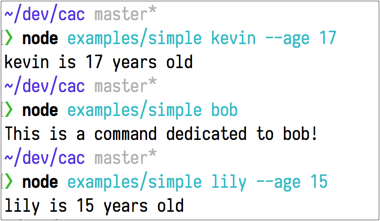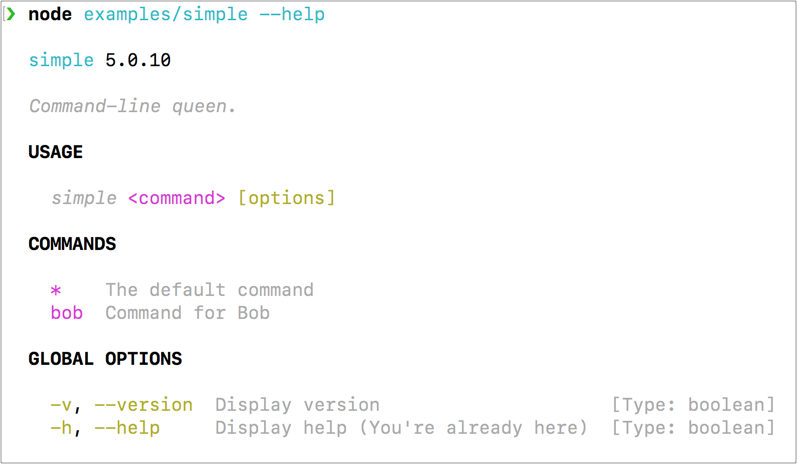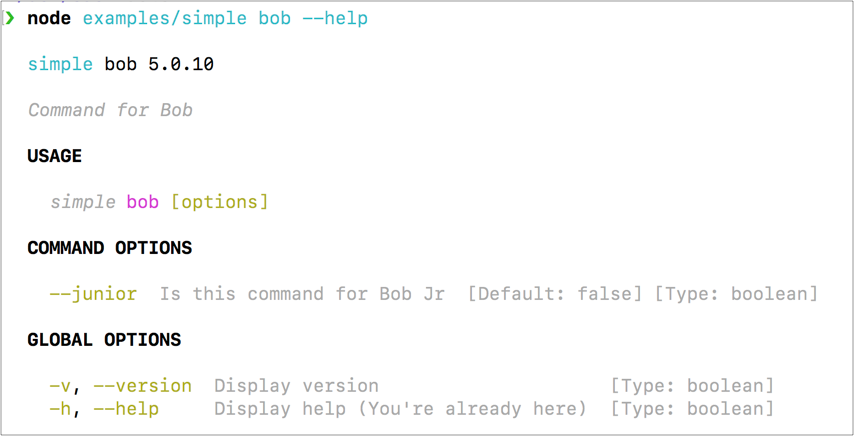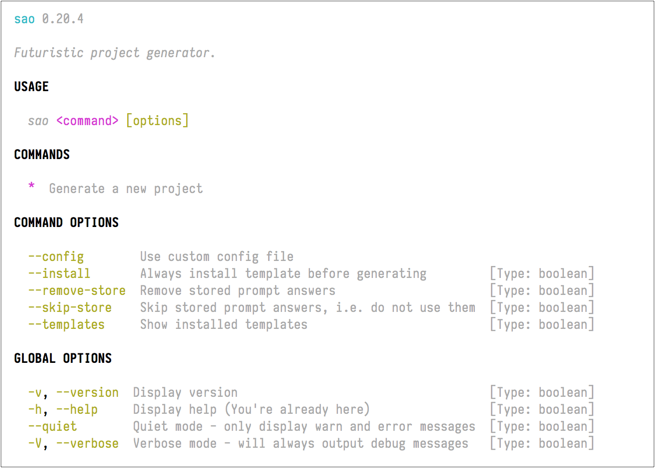Package Exports
- cac
This package does not declare an exports field, so the exports above have been automatically detected and optimized by JSPM instead. If any package subpath is missing, it is recommended to post an issue to the original package (cac) to support the "exports" field. If that is not possible, create a JSPM override to customize the exports field for this package.
Readme

Introduction
Command And Conquer, the queen living in your command line, is a minimalistic but pluggable CLI framework.
Install
yarn add cacTable of contents
Usage
Use ./examples/simple.js as example:
const cac = require('cac')
const cli = cac()
// Add a default command
const defaultCommand = cli.command('*', {
desc: 'The default command'
}, (input, flags) => {
if (flags.age) {
console.log(`${input[0]} is ${flags.age} years old`)
}
})
defaultCommand.option('age', {
desc: 'tell me the age'
})
// Add a sub command
cli.command('bob', {
desc: 'Command for bob'
}, () => {
console.log('This is a command dedicated to bob!')
})
// Bootstrap the CLI app
cli.parse()Then run it:

And the Help Documentation is ready out of the box:

The Help Documentation will be command-specific when you are using --help with a sub command, like below:

Friends
Projects that use CAC:
- SAO: ⚔️ Futuristic scaffolding tool.
- DocPad: 🏹 Powerful Static Site Generator.
- Poi: ⚡️ Delightful web development.
- bili: 🥂 Schweizer Armeemesser for bundling JavaScript libraries.
- lass: 💁🏻 Scaffold a modern package boilerplate for Node.js.
- Feel free to add yours here...
Documentation
CLI instance
You can create a CLI instance as follows:
const cli = cac(options)options argument is optional here:
options.bin: The CLI bin name to show in help message when--helpflag is used.options.defaultOpts: By default we add serveral global command options like--helpand--version, however you can disable them all by setting it tofalseor configure them individually as follow:options.defaultOpts.help:trueShow help message when--helpflag is used, alias flag-h.options.defaultOpts.version:trueShow version number when--versionflag is used, alias flag-v.
cli.option(name, [option])
Register an option globally, i.e. for all commands
- name:
stringoption name - option:
objectstring- desc:
stringdescription - alias:
stringArray<string>option name alias - type:
stringoption type, valid values:booleanstring - default:
anyoption default value - required:
booleanmark option as required - choices:
Array<any>limit valid values for the option
- desc:
cli.command(name, [option], [handler])
- name:
string - option:
objectstring(stringis used asdesc)- desc:
stringdescription - alias:
stringArray<string>command name alias - examples:
Array<string>command examples - match:
(name: string) => booleanA custom command matcher
- desc:
- handler:
functioncommand handler- input:
Array<string>cli arguments - flags:
objectcli flags
- input:
const command = cli.command('init', 'init a new project', (input, flags) => {
const folderName = input[0]
console.log(`init project in folder ${folderName}`)
})cli.command returns a command instance.
command
command.option(name, [option])
Same as cli.option but it adds options for specified command.
cli.parse([argv], [option])
- argv:
Array<string>Defaults toprocess.argv.slice(2) - option
- run:
booleanDefaults totrueRun command after parsed argv.
- run:
cli.showHelp()
Display cli helps, must be called after cli.parse()
cli.use(plugin)
- plugin:
PluginArray<Plugin>
Apply a plugin to cli instance:
cli.use(plugin(options))
function plugin(options) {
return cli => {
// do something...
}
}cli.bin
Type: string
The filename of executed file.
e.g. It's cli.js when you run node ./cli.js.
cli.argv
A getter which simply returns cli.parse(null, { run: false })
cli.extraHelp(help)
Add extra help messages to the bottom of help.
help
Type: string object
The help could be a string or in { title, body } format.
Events
error
Error handler for errors in your command handler:
cli.on('error', err => {
console.error('command failed:', err)
process.exit(1)
})parsed
Emit after CAC parsed cli arguments:
cli.on('parsed', (command, input, flags) => {
// command might be undefined
})executed
Emit after CAC executed commands or outputed help / version number:
cli.on('executed', (command, input, flags) => {
// command might be undefined
})FAQ
Why not commander.js yargs caporal.js or meow ?
CAC is simpler and less opinionated comparing to commander.js yargs caporal.js.
Commander.js does not support chaining option which is a feature I like a lot. It's not really actively maintained at the time of writing either.
Yargs has a powerful API, but it's so massive that my brain trembles. Meow is simple and elegant but I have to manully construct the help message, which will be annoying. And I want it to support sub-command too.
And none of them are pluggable.
So why creating a new thing instead of pull request?
I would ask me myself why there's preact instead of PR to react, and why yarn instead of PR to npm? It's obvious.
CAC is kind of like a combination of the simplicity of Meow and the powerful features of the rest. And our help log is inspired by Caporal.js, I guess it might be the most elegant one out there?

How is the name written and pronounced?
CAC, not Cac or cac, pronounced C-A-C.
And this project is dedicated to our lovely C.C. sama. Maybe CAC stands for C&C as well :P

Contributing
- Fork it!
- Create your feature branch:
git checkout -b my-new-feature - Commit your changes:
git commit -am 'Add some feature' - Push to the branch:
git push origin my-new-feature - Submit a pull request :D
Author
cac © egoist, Released under the MIT License.
Authored and maintained by egoist with help from contributors (list).
egoist.moe · GitHub @egoist · Twitter @_egoistlily



